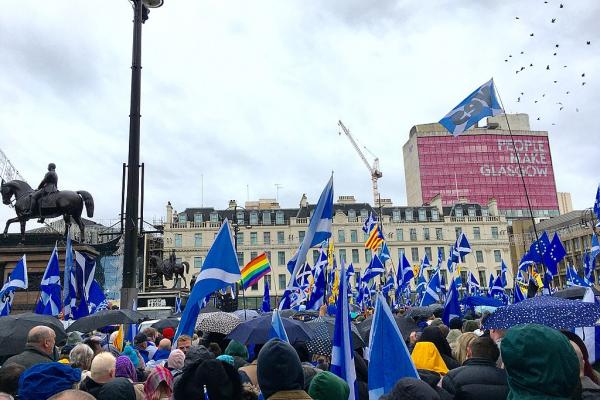Richard Parry discusses how, five years on, the Brexit referendum will influence any future Scottish independence referendum.
The 2016 Brexit referendum was a spectacular example of the use of an extra-parliamentary route to address divisions in the ruling party on an important issue. It took the UK political system back to the first use of this device, the 1975 European referendum, when as in 2016 the official position of all the major parties was in favour of ‘Europe’ but the ‘correct’ result prevailed and withdrawal did not have to be worked through.
After 1975 referendums came to be used in what might be seen as a more constitutionally proper way, as a confirmation of a detailed scheme already set out in legislation. In 2011 alone there were two, in Wales on the granting of primary law-making powers to the National Assembly (won easily), and in the UK on the use of the alternative vote system in parliamentary elections (lost easily). In a slight variant in 1998, the power-sharing political arrangements in the Good Friday agreement in Northern Ireland were fixed in detail before being agreed by referendum, with legislation following. In 1979 Scottish and Welsh devolution was already in law when put to a poll which won in Scotland and lost in Wales. In a final twist the Scottish law foundered on a provision allowing the UK Parliament to repeal it if less than 40% of the total electorate had voted yes.
For Scottish and Welsh devolution in 1997, a detailed law had not been passed but government proposals gave voters an accurate idea on what would happen if they voted yes. Even the tiny margin in favour of Welsh devolution did not occasion any effective demand for amendment of the proposals or a further referral of them to the electorate. The 2004 referendum on an elected regional assembly in the North East of England was of similar character though the detailed offered was less and the idea was defeated. The creation of elected city mayors in England also required referendums under the Local Government Act 2000.
The referendums of 2014 in Scotland and 2016 UK-wide were different, more like a state-sponsored opinion poll to test the popular will prior to the technical working-out of its consequences. The Scottish Government offered great detail on its post-independence scenario but this did require a co-operative response from the UK government that showed no sign of being on offer (especially on currency).
The Brexit parallel of a rupture in which the spurned larger partner has no incentive to facilitate the rejection remains in the background for the SNP, and there are also two more specific lessons from 2016. The yes vote of 51.9% with wide territorial variations was sustained as the ‘will of the people’, with calls for a second vote beaten back at Westminster as the plea for a rerun by a sore loser. Given that the futile yes majority for devolution in 1979 was barely less (51.6%) this is a powerful precedent. It makes it harder for any UK ploy of a double referendum, the first to establish the principle before negotiations, the second to tick the terms and conditions box.
The second lesson is that there is another way of confirming a policy – a general election victory. This was Boris Johnson’s route in late 2019. In politics you are only as good as your last electoral performance. The SNP’s slip to 37% of the vote in the 2017 UK election derailed their strategy of preventing Scotland from being taken out of the EU against its will. A settled democratic theory of referendums would specify the point at which the democratic mandate is secured; in the UK the mandate remains provisional until the change takes legal effect. As with Brexit in 2016, a referendum yes for independence would even if narrow be an authentic expression of will; without a worked-out and enacted scheme it would also became the start and not the end point of a political process likely to be punctuated by elections at Westminster or Holyrood.
Image from LornaMCampbell used under Creative Commons licence Attribution-Share Alike 4.0 International

